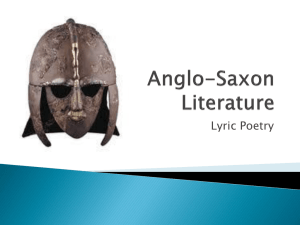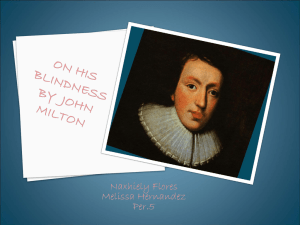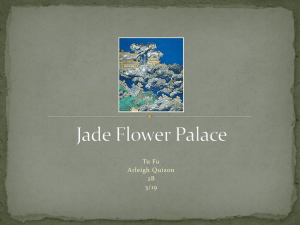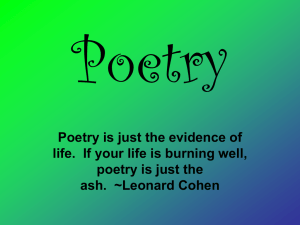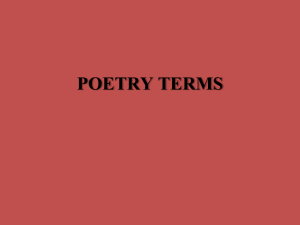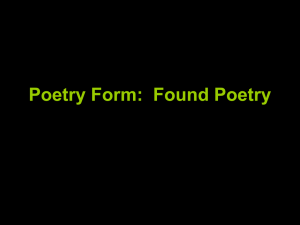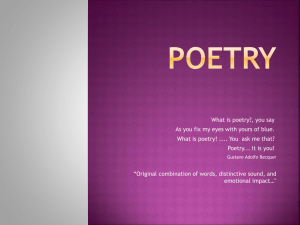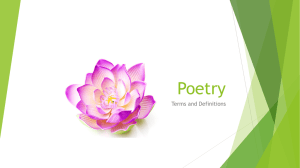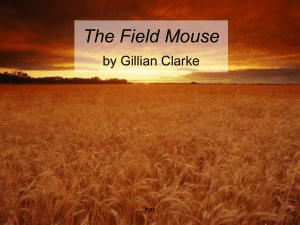File - Mrs. O`s Brit Lit Webpage
advertisement
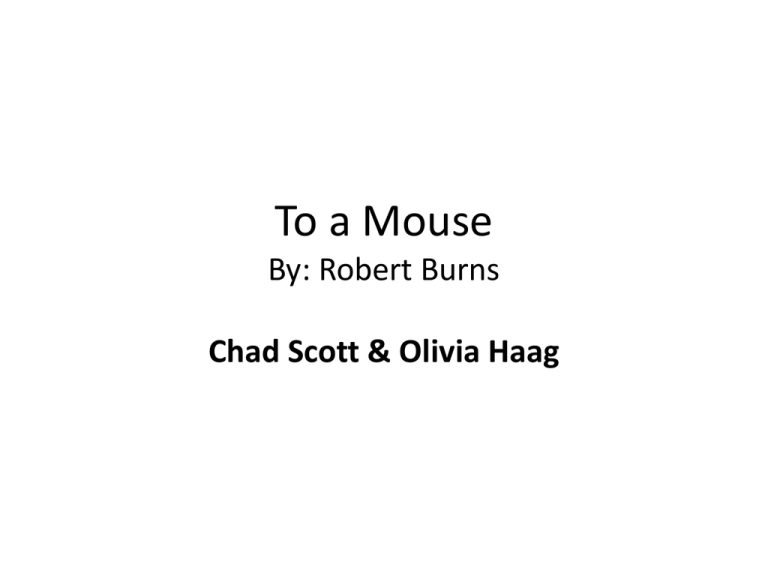
To a Mouse By: Robert Burns Chad Scott & Olivia Haag To a Mouse Small, sleek, cowering, timorous beast, O, what a panic is in your breast! You need not start away so hasty With hurrying scamper! I would be loath to run and chase you, With murdering plough-staff. You saw the fields laid bare and wasted, And weary winter coming fast, And cozy here, beneath the blast, You thought to dwell, Till crash! the cruel plough past Out through your cell. I'm truly sorry man's dominion Has broken Nature's social union, And justifies that ill opinion Which makes thee startle At me, thy poor, earth born companion And fellow mortal! That small bit heap of leaves and stubble, Has cost you many a weary nibble! Now you are turned out, for all your trouble, Without house or holding, To endure the winter's sleety dribble, And hoar-frost cold. I doubt not, sometimes, but you may steal; What then? Poor beast, you must live! An odd ear in twenty-four sheaves Is a small request; I will get a blessing with what is left, And never miss it. But Mouse, you are not alone, In proving foresight may be vain: The best laid schemes of mice and men Go often askew, And leaves us nothing but grief and pain, For promised joy! Your small house, too, in ruin! It's feeble walls the winds are scattering! And nothing now, to build a new one, Of coarse grass green! And bleak December's winds coming, Both bitter and keen! Still you are blest, compared with me! The present only touches you: But oh! I backward cast my eye, On prospects dreary! And forward, though I cannot see, I guess and fear! Literal Sense What is the literal sense of the poem? You are a small nervous mouse. You should slow down. I will not hurt you. I’m sorry that man has ruined nature and given you a reason to be scared. You are a fellow friend. Your house is in ruin. Wind comes through the walls. You can’t build a new one. Winter is coming. Winter is coming; you are cozy till you crash. Small leaves have made you nibble. Now you have to endure the cold. Mouse you are not alone. Plans fail and leave us nothing but pain. You are blessed compared to me. You only see present. I think about the future. I guess and fear. Literal Sense What does the poem mean? The poem is a metaphor for the speaker’s life. He is using a mouse’s life to describe his own life. The mouse and small and scared, and so is the speaker. The speaker is mad at men and society for ruining nature. The speaker has a house he cannot improve. Winter and hard times are coming their way. They have to endure the hard times means that they don’t enjoy it and just try and get by without enjoying life. The speaker feels that even a mouse has it better off than himself. He does not look forward to the future, he has no hope. • Diction To a Mouse by: Robert Burns This man is hopeless and scared for the future, just like it talks about in the poem. • • This poem uses formal language, abstract language, and also vivid details. In the poem, Robert Burns does innovative ideas by manipulating syntax words such as, “At me, thy poor, earth born companion And fellow mortal!” In modern days, no one talks like that, therefore it catches the readers attention. We did not find any connotations in our poem, but many words that we were uncertain of. I chose to define, Dominion, which means the power or right of governing and controlling; sovereign authority. The author has no authority and he is a hopeless man, saying that he is “Sorry man’s dominion has broken nature’s social union.” • Rhetorical Situations • The author is speaking to the us, the audience. He is talking about how he is very unhappy with his life. The occasion of which is he is speaking on is to tell the audience about his life and the struggles he has been through. The relationship between the reader and author is the author is informing us about his life and how hard it has been. We are being spoken to directly, and are overhearing the speaker. TONE To a Mouse expresses a sad hopeless tone throughout the poem. It creates the a hopeless atmosphere MOOD What does the author make you feel? While reading to a mouse, I felt sad and gloomy. The author try's to make you feel helpless and hopeless, he succeeds because you feel sad while reading this poem. Literary Devices To a Mouse Contains only a few Literary devices. The poem as a whole is a metaphor comparing the speaker’s life to a mouse’s life. This is the only metaphor in the poem, there are also no similes in the poem. There is one example of personification that gives nature a human like characteristic. The only other literary devices are alliteration found throughout the poem. Sound and Rhyme Rhyme The Rhyme scheme of “To a Mouse” is very unique. It does not follow a pattern and in some stanza’s does not rhyme at all while others rhyme every word. Burns also uses a lot of slant rhyme in this poem. Sound The poem uses a lot of alliteration, and repetition. The poem does not contain any other types of sound like: assonance, onomatopoeia, or cacophony. Poem Structure • Our poem is not a sonnet, but does have a somewhat formal structure to it. There are 8 stanzas with 6 lines in each stanza. Some rhyme and some do not. Imagery This poem creates pictures of a cold windy day, and a little mouse struggling to keep warm. You hear the winds gust, and you can imagine the little house swaying in the wind because of the huge gusts of wind. You also have a visual image of the “sleety dribbles” of melting snow, and can imagine how cold something like that is.


